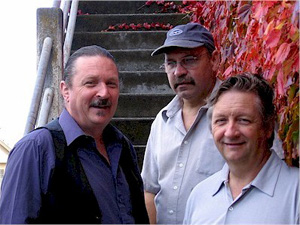

Jeff Sherman Electric & Acoustic Guitars, Alembic Small Standard Series I & Thorn Custom Inlay Bass Guitars, Fender-Rhodes Piano, Korg O1W, StudioLogic Bass Pedal MIDI-Controller, Korg KAOS KP2 MIDI Controller Pad, Natural & Modified Sound Samples, Vocals
Jerry Cook Drums, Tunable Concert Timpani, Moog Drums, Mini-Moog synthesizer, Percussion, Gong, Electronic Drums, Roto-Toms, Drum Samples
Greg Sherman Acoustic & Electric Pianos, Hohner Clavinet, ARP, Nord and Oberheim Synthesizers, Mellotron, Hammond Organ & Custom Electronics, Roland A-90, Korg O1Ws
Glass began in the late 1960s as a Port Townsend-based rock band named The Outcasts, playing covers and the occasional original piece. On September 6, 1968 they attended a Jimi Hendrix concert at the Seattle Center Coliseum where the British band The Soft Machine was the opening act. They were transfixed by The Soft Machine, a guitar-less power trio. Shortly thereafter they changed their name to Glass and began playing originals exclusively. Moving to Olympia, Washington in 1971 to attend The Evergreen State College, they quickly became favorites on-campus for their spirited performances. Numerous live performances in and around Olympia, Seattle, Tacoma, Bellingham, Port Townsend, and other Pacific Northwest venues (including the first-ever live broadcast concert on KAOS-FM) gave them considerable local attention and accolades. Professional studio recordings were made in 1975, which they then shopped around to various record labels at home and abroad in an attempt to land a recording contract.
Unfortunately the mid-1970s was not a good time for rehearsal-intensive progressive rock. The music industry was being taken over by punk rock and disco to the point where even well-established rock acts were being dropped from their labels. Despite their well-honed local reputation, Glass found themselves unable to attract a recording contract.
Disappointed and disillusioned, the band officially called it quits in late 1976 rather than compromise their vision.
Twenty years passed. By the mid-1990s a full-scale progressive rock revival was brewing, thanks to the Internet and the new economics of CD releases. Glass began contemplating a reunion and started testing the waters by contacting old fans and making new business contacts. In 1999 band rehearsals began, proving the magic was still there. Old tapes were dusted off and prepared for an archival release. The record label Relentless Pursuit was set up to release Glass music and solo recordings by the band members. After considerable digital cleanup and editing, a 2-CD set of recordings from 1973-1977 was released, entitled No Stranger To The Skies. Following the resounding success of that release a third volume was released the following year. Several concerts were arranged and performed, not only in the Pacific Northwest but also in Mexico (BajaProg Festival in 2002 and 2004), ProgWest Festival (Claremont CA, 2001), and Progman Cometh Festival (Seattle 2002 and 2003).
The acclaim that their live performances garnered attracted the attention of French independent progressive rock label Musea Records, who in 2004 offered to re-release No Stranger To The Skies and give it worldwide distribution. Simultaneously the Sherman brothers were brimming with ideas for new music, and began writing and rehearsing brand new material for their "first all-original album in 27 years." This album, Illuminations (with cover photo by soundman Erik Poulsen) was released by Musea in 2005 to great reviews. Bringing the music full circle, it features guest appearances by some of the cream of the British progressive rock movement, including Hugh Hopper, (ex-Soft Machine), Richard Sinclair and Phil Miller.
In October 2007 Glass embarked on their first-ever European tour to support their newly released live recording on Musea, Glass Live At Progman Cometh.
Glass returned to the recording studio in 2008 and 2009 to finish their 4th album for Musea entitled Spectrum Principle. It was released worldwide on October 15, 2010. Produced largely by drummer Jerry Cook, it is a departure from their last studio album Illuminations.
In April 2011 Glass returned to their hometown of Port Townsend, Washington, to record a "live in-the-studio" album. They booked the old Arcadia Barn, where they had recorded thirty-eight years earlier, now renovated and called "The Palindrome." Produced by bassist Jeff Sherman, the album was recorded in Zen style—the band did not undergo the usual months of pre-recording preparations but instead came together in the barn and played whatever ideas came to mind. They were also given permission to record inside The First Presbyterian Church of Port Townsend on their magnificent 1849 Whalley-Genung pipe organ. These recordings were recorded directly to two-track analog master tapes, mastered by Michael King (author of Wrong Movements: A Robert Wyatt Biography), and released in 2014 on Musea Records as Palindrome.
Glass' latest, Emergence, released to critical reviews.
Watch the slideshow from the Colorado Sessions.